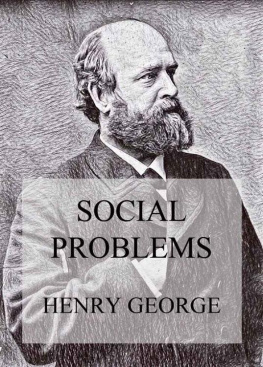PREFACE.
The first eleven chapters of thisbook are revised from articles published in Frank Leslie's IllustratedNewspaper, during the first half of this year, under the title of "Problems of the Time." In the chapters which follow, I have more fullydeveloped the lines of thought there begun. My endeavor has been to present themomentous social problems of our time, unencumbered by technicalities, andwithout that abstract reasoning which some of the principles of PoliticalEconomy require for thorough explanation. I have spoken in this book of somepoints not touched upon, or but lightly touched upon, in "Progress andPoverty," but there are other points as to which I think it would be worththe while of those who may be interested by this book to read that.
HENRY GEORGE.
Brooklyn, December 7, 1883.
CHAPTER I. THE INCREASING IMPORTANCE OFSOCIAL QUESTIONS.
There come moments in our livesthat summon all our powers -when we feel that, casting away illusions, wemust decide and act with our utmost intelligence and energy. So in the lives ofpeoples come periods specially calling for earnestness and intelligence.
We seem to have entered one ofthese periods. Over and again have nations and civilizations been confrontedwith problems which, like the riddle of the Sphinx, not to answer was to bedestroyed; but never before have problems so vast and intricate been presented.This is not strange. That the closing years of this century must bring upmomentous social questions follows from the material and intellectual progressthat has marked its course.
Between the development ofsociety and the development of species there is a close analogy. In the lowestforms of animal life there is little difference of parts; both wants and powersare few and simple; movement seems automatic; and instincts are scarcelydistinguishable from those of the vegetable. So homogeneous are some of theseliving things, that if cut in pieces, each piece still lives. But as life risesinto higher manifestations, simplicity gives way to complexity, the partsdevelop into organs having separate functions and reciprocal relations, newwants and powers arise, and a greater and greater degree of intelligence isneeded to secure food and avoid danger. Did fish, bird or beast possess nohigher intelligence than the polyp, Nature could bring them forth only to die.
This law that the increasingcomplexity and delicacy of organization which give higher capacity andincreased power are accompanied by increased wants and dangers, and require,therefore, increased intelligence runs through nature. In the ascending scaleof life at last comes man, the most highly and delicately organized of animals.Yet not only do his higher powers require for their use a higher intelligencethan exists in other animals, but without higher intelligence he could notlive. His skin is too thin; his nails too brittle; he is too poorly adapted forrunning, climbing, swimming, or burrowing. Were he not gifted with intelligencegreater than that of any beast, he would perish from cold, starve frominability to get food, or be exterminated by animals better equipped for thestruggle in which brute instinct suffices.
In man, however, the intelligencewhich increases all through nature's rising scale passes at one bound into anintelligence so superior, that the difference seems of kind rather than degree.In him, that narrow and seemingly unconscious intelligence that we callinstinct becomes conscious reason, and the godlike power of adaptation andinvention makes feeble man nature's king.
But with man the ascending linestops. Animal life assumes no higher form; nor can we affirm that, in all hisgenerations, man, as an animal, has a whit improved. But progression in anotherline begins. Where the development of species ends, social developmentcommences, and that advance of society that we call civilization so increaseshuman powers, that between savage and civilized man there is a gulf so vast asto suggest the gulf between the highly organized animal and the oyster glued tothe rocks. And with every advance upon this line new vistas open. When we tryto think what knowledge and power progressive civilization may give to the menof the future, imagination fails.
In this progression which beginswith man, as in that which leads up to him, the same law holds. Each advancemakes a demand for higher and higher intelligence. With the beginnings ofsociety arises the need for social intelligence for that consensus of individualintelligence which forms a public opinion, a public conscience, a public will,and is manifested in law, institutions and administration. As society develops,a higher and higher degree of this social intelligence is required, for therelation of individuals to each other becomes more intimate and important, andthe increasing complexity of the social organization brings liability to newdangers.
In the rude beginning, eachfamily produces its own food, makes its own clothes, builds its own house, and,when it moves, furnishes its own transportation. Compare with this independencethe intricate interdependence of the denizens of a modern city. They may supplythemselves with greater certainty, and in much greater variety and abundance,than the savage; but it is by the co-operation of thousands. Even the waterthey drink, and the artificial light they use, are brought to them by elaboratemachinery, requiring the constant labor and watchfulness of many men. They maytravel at a speed incredible to the savage; but in doing so resign life andlimb to the care of others. A broken rail, a drunken engineer, a carelessswitchman, may hurl them to eternity. And the power of applying labor to thesatisfaction of desire passes, in the same way, beyond the direct control ofthe individual. The laborer becomes but part of a great machine, which may atany time be paralyzed by causes beyond his power, or even his foresight. Thusdoes the well-being of each become more and more dependent upon the well-beingof all the individual more and more subordinate to society.
And so come new dangers. The rudesociety resembles the creatures that though cut into pieces will live; thehighly civilized society is like a highly organized animal: a stab in a vitalpart, the suppression of a single function, is death. A savage village may beburned and its people driven off but, used to direct recourse to nature, theycan maintain themselves. Highly civilized man, however, accustomed to capital,to machinery, to the minute division of labor, becomes helpless when suddenlydeprived of these and thrown upon nature. Under the factory system, some sixtypersons, with the aid of much costly machinery, co-operate to the making of apair of shoes. But, of the sixty, not one could make a whole shoe. This is thetendency in all branches of production, even in agriculture. How many farmersof the new generation can use the flail? How many farmers' wives can now make acoat from the wool? Many of our farmers do not even make their own butter orraise their own vegetables! There is an enormous gain in productive power fromthis division of labor, which assigns to the individual the production of but afew of the things, or even but a small part of one of the things, he needs, andmakes each dependent upon others with whom he never comes in contact; but thesocial organization becomes more sensitive. A primitive village community maypursue the even tenor of its life without feeling disasters which overtakeother villages but a few miles off; but in the closely knit civilization towhich we have attained, a war, a scarcity, a commercial crisis, in onehemisphere produces powerful effects in the other, while shocks and jars fromwhich a primitive community easily recovers would to a highly civilizedcommunity mean wreck.












